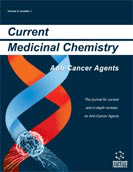Abstract
Angiogenesis, the formation of new blood vessels from preexisting microvasculature is a highly regulated process. Angiogenesis is controlled by both positive and negative factors thus providing several targets for drug discovery. Targeting tumor endothelial cells has gained much attention with the notion that tumors can be starved to death by cutting the lifeline of tumor cells, i.e. vascular endothelial cells. In this regard, the inhibition of angiogenesis represents a new approach to cancer therapy and several agents and approaches are in different stages of clinical development. A paradigm shift is expected in the treatment of malignancies because of the recent introduction of mechanism-based systemic therapies that may be more specific, less toxic, and more effective. These inhibitors were recently shown to constitute a new modality for cancer treatment. In this chapter, we will review the recent angiogenesis inhibitors-related patent literature. This review will cover specifically the discovery and development disclosures of endogenous inhibitors. The scope of this chapter is to give the reader a well structured patent literature overview of agents targeting different steps of the angiogenic process. Finally, we have summarized the key attributes of the emerging endogenous angiogenesis inhibitors that make them a potent antitumor agents.
Keywords: Angiogenesis, angiostatin, anti-angiogenesis inhibitors, cancer, endostatin, receptor tyrosine kinase and kringle, vascular target, VEGF.






















